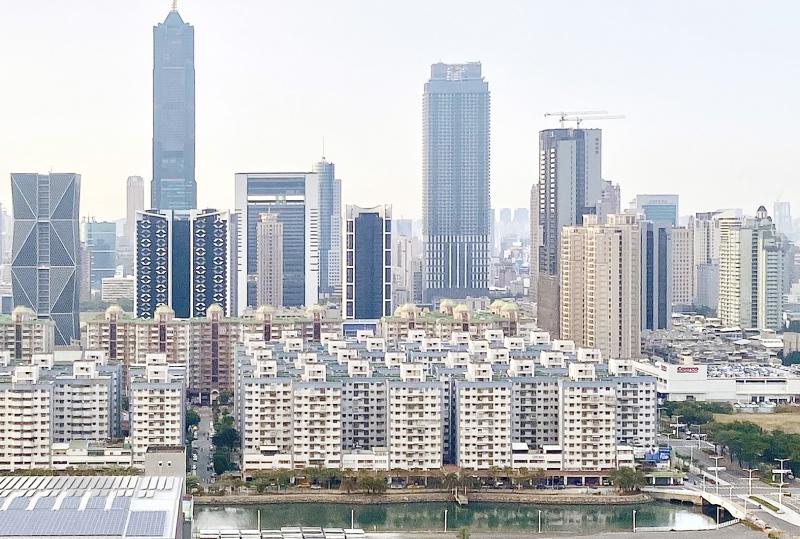Lawmakers across party lines yesterday agreed to July 1 as the provisional date on which a draft amendment to the Income Tax Act (所得稅法) is to come into effect, with the aim of curbing real-estate speculation.
The consensus was reached following interparty negotiations at the legislature’s Finance Committee to determine when revisions to the “integrated house and land transaction income tax” would take effect.
The committee on Monday last week passed a number of revisions to the act, but failed to agree on when they would take effect.

Photo: CNA
Under the proposed revisions, the tax would be set at 45 percent of gains on the sale of property within two years of purchase and 35 percent of gains on property sales made within two to five years of purchase.
For foreign nationals and companies, the tax rate on property sales would be 35 percent on any property held for more than two years.
The same tax rate would be imposed on individuals and businesses to prevent individuals from setting up companies to buy and sell property, and paying only 20 percent corporate income tax on gains.
At present, the integrated house and land transaction income tax rate is 45 percent of gains on sales of property made within a year of purchase and 35 percent of gains on sales of property made within one to two years of purchase — but those rates only apply to individuals.
The revisions also widen the scope of properties to which the tax applies.
For example, the tax currently applies only to transactions of existing residential properties not considered to be for “self-use,” whereas the new measure would also apply to the sale of presale homes, above-ground use of land rights (superficies) and special shareholdings.
The measures would be applied retroactively to transactions from 2016.
Lawmakers also agreed to add a clause to the revisions in which individuals and businesses given a share of a land or property as a result of urban renewal projects would enjoy a 20 percent tax on gains made from property sales made within five years.
The proposed revisions have been sent to the legislature’s plenary session for discussion.
The integrated house and land transaction income tax was introduced in 2016 to reduce property speculation, especially in the residential property market.
The latest measures have been proposed as the property market heats up at a time of high liquidity and low interest rates.

Anna Bhobho, a 31-year-old housewife from rural Zimbabwe, was once a silent observer in her home, excluded from financial and family decisionmaking in the deeply patriarchal society. Today, she is a driver of change in her village, thanks to an electric tricycle she owns. In many parts of rural sub-Saharan Africa, women have long been excluded from mainstream economic activities such as operating public transportation. However, three-wheelers powered by green energy are reversing that trend, offering financial opportunities and a newfound sense of importance. “My husband now looks up to me to take care of a large chunk of expenses,

SECTOR LEADER: TSMC can increase capacity by as much as 20 percent or more in the advanced node part of the foundry market by 2030, an analyst said Taiwan Semiconductor Manufacturing Co (TSMC, 台積電) is expected to lead its peers in the advanced 2-nanometer process technology, despite competition from Samsung Electronics Co and Intel Corp, TrendForce Corp analyst Joanne Chiao (喬安) said. TSMC’s sophisticated products and its large production scale are expected to allow the company to continue dominating the global 2-nanometer process market this year, Chiao said. The world’s largest contract chipmaker is scheduled to begin mass production of chips made on the 2-nanometer process in its Hsinchu fab in the second half of this year. It would also hold a ceremony on Monday next week to

TECH CLUSTER: The US company’s new office is in the Shalun Smart Green Energy Science City, a new AI industry base and cybersecurity hub in southern Taiwan US chip designer Advanced Micro Devices Inc (AMD) yesterday launched an office in Tainan’s Gueiren District (歸仁), marking a significant milestone in the development of southern Taiwan’s artificial intelligence (AI) industry, the Tainan City Government said in a statement. AMD Taiwan general manager Vincent Chern (陳民皓) presided over the opening ceremony for the company’s new office at the Shalun Smart Green Energy Science City (沙崙智慧綠能科學城), a new AI industry base and cybersecurity hub in southern Taiwan. Facilities in the new office include an information processing center, and a research and development (R&D) center, the Tainan Economic Development Bureau said. The Ministry

State-run CPC Corp, Taiwan (CPC, 台灣中油) yesterday signed a letter of intent with Alaska Gasline Development Corp (AGDC), expressing an interest to buy liquefied natural gas (LNG) and invest in the latter’s Alaska LNG project, the Ministry of Economic Affairs said in a statement. Under the agreement, CPC is to participate in the project’s upstream gas investment to secure stable energy resources for Taiwan, the ministry said. The Alaska LNG project is jointly promoted by AGDC and major developer Glenfarne Group LLC, as Alaska plans to export up to 20 million tonnes of LNG annually from 2031. It involves constructing an 1,290km